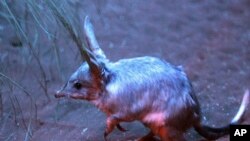Experts have said that rare footage of an endangered marsupial in outback Australia is a sign that native animals are beginning to recover from years of feral cat predation.
Feral cats threaten the survival of over 100 native species in Australia, according to federal environment officials.
The opportunistic predators have caused the extinction of some ground-dwelling birds and small to medium-sized mammals.
Experts have said they have been a “major cause of decline” for many endangered marsupials, including the bilby, bandicoot, bettong and numbat.
In the northern state of Queensland, though, there are signs that some native animals are beginning to recover.
At the Astrebla Downs National Park, 1,500 kilometers northwest of Brisbane, 3,000 feral cats have been removed since 2013.
Licensed hunters have said that thermal imaging technology, rather than powerful spotlights, have helped them control the wild cat population by making it easier to find them hiding in vegetation.
A recent survey in the region revealed a record number of 471 bilbies, one of Australia’s best-known marsupials.
Also, for the first time in a decade, researchers managed to film a threatened desert marsupial in outback Queensland in June.
“It is called a kowari," said ecologist John Augusteyn, who shot the footage. “They are a little, tiny carnivorous marsupial that lives in outback, or arid, western Queensland and also down in South Australia. They are a very charismatic little guy. Very fast, very inquisitive.”
Ecologists say that decent rainfall has also helped to boost marsupial numbers.
Nearly 3 billion animals in Australia were killed or displaced by the devastating “Black Summer” bushfires in 2019 and 2020, according to scientists.
They have said that the biggest cause of species decline in Australia is habitat loss.




